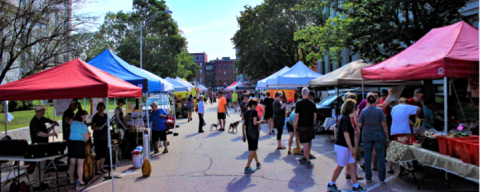Rural Character is about People and Community
Rural character is about community not just place so it may be time to expand our thinking on what it means for the future. New Hampshire residents and businesses value our rural character – sometimes called small town life. Visitors come to our state to experience the small-town charm, scenic beauty, and recreational opportunities we offer. We are seeing an uptick in the interest in our small towns for recreation, working from home and in our housing market. We have needed homes for people who work and want to live here, and we know that our small businesses need employees to help run our shops and serve at our restaurants. These needs were evident in recent years and the pandemic may have magnified and multiplied them.
These dynamics have me thinking about rural character. We often think of it in terms of landscape, natural features, and the built environment. A small place with small, local shops on main street. There are farms with cows grazing and sheep out in the pasture. There is little traffic and long scenic roads leading to hiking, ski trails and fishing holes. There are forests which are home to wildlife and open for recreation. At our recent Resiliency Academy, we asked 100 NH small business and community participants to define rural character. The answers we received, although not a scientific study, are interesting and revealing. Rural character was defined as being about people and community. Of knowing your neighbors and those you pass on the street. Of knowing your community and organizing and participating in community events to stay connected. Of being in a community where people are connected, helping, and enjoying one another. A true community spirit of belonging. In our community work across the state, we also see rural character shared as something NH residents highly value.
The question becomes, how do we hold onto our ideas of rural character and address the challenges before us? I think we can embrace rural character to strengthen – not limit – our communities. We can do this by focusing on community and social connections and not just the impacts on our built and natural environment. We should consider different types of quality housing so our kids can move back to our towns and young families can begin here. We need their ideas, energy, and creativity. We can work hard to continue to forge strong community connections through town events while taking advantage of connections that expanded broadband can give. We can expand our friendships and neighborliness to newcomers who choose our communities for home, work, school, and recreation. We need the next generation to be ready to run our small businesses and serve on our municipal boards. This all seems possible when we consider rural character not just about place but about a community and its people that are welcoming, connected and sharing experiences. Are we willing to reconsider rural character to help build strong communities? Here are some things to do:
1. Talk about rural character and what that means in individual towns. This can be a question at town meeting, in your listserv or at the recycling center. This helps build trust and expands understanding.
2. When working on visioning for your master plan or other guiding documents, go beyond just accepting that you are embracing rural character. Dig a little deeper to see how the assumptions, values or lack of clarity might be limiting what you can do to address challenges.
3. Consider change that is small, slow, incremental and will enhance rural character while addressing the need for new homes, new people, new businesses, and jobs.
4. In all these efforts, think beyond the natural and built environment and focus on the sense of community and the positive impact you might have to further share your community with others.

